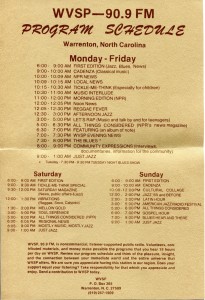WVSP 90.9 FM
 We’ve written about WVSP on this blog before–it was the pioneering Warrenton station that mingled activism, journalism, and community development. But what did it play? Take a look.
We’ve written about WVSP on this blog before–it was the pioneering Warrenton station that mingled activism, journalism, and community development. But what did it play? Take a look.
Dec 12
 We’ve written about WVSP on this blog before–it was the pioneering Warrenton station that mingled activism, journalism, and community development. But what did it play? Take a look.
We’ve written about WVSP on this blog before–it was the pioneering Warrenton station that mingled activism, journalism, and community development. But what did it play? Take a look.

Advertisement for WAFR’s second annual fundraising marathon from Durham’s Carolina Times newspaper, 1973
WAFR and WVSP were no ordinary radio stations. Amid a media landscape that was overwhelmingly commercial, both stations were non-commercial. They depended on neither advertising revenue nor funding from any established institution like a college or university.
Raising the funds needed for a non-commercial broadcasting was far from easy, however. These stations survived for years on a mix of modest federal funding, grants, and listener donations from regular fundraising campaigns. But WAFR and WVSP both eventually folded largely due to the overwhelming and constant challenges of raising adequate funds for maintaining station operations.
But as long as they were on the air, both stations never let their audiences forget that they were listening to non-commercial radio, as the audio clip from WAFR’s 1975 fundraising marathon demonstrates.
(Don’t see the audio player? Try Safari or Firefox. Or use the QR code below.)
WAFR and WVSP embodied a participatory vision of media based in local communities. At both stations, volunteers without any prior experience in media could complete the necessary FCC-mandated training that allowed them to host their own shows on the air. Volunteers accounted for a large majority of broadcasting hours at both stations.
The excerpt below from the April 1978 issue WVSP’s Dialogue invites listeners not only to underwrite programming, but to share recordings of meetings and lectures and even submit audio interviews of people on the street to the station, all to be played over the air.
Mar 20

Yomi Moses, a Nigerian student at North Carolina Central University, leads children in singing their ABCs at a meeting of the Community Radio Workshop. Moses also gave lessons in his native Yoruban language at the CRW.
When WAFR commenced broadcasting in September 1971, it didn’t take long for listeners to discern that the station’s staffers had chosen their call letters as an homage to Africa. Indeed, with programming that celebrated African history, politics, and culture, WAFR made Pan-Africanism a main component of its programming–something that no American radio station had done before. As Obataiye Akinwole, one of the station’s founders explained in an interview for the 1995 documentary Black Radio: Telling It Like It Is, “We wanted to have our heritage in our name.”
Deejays at WAFR also assumed on-air names that emphasized the group’s collective Pan-African identity, not unlike members of black nationalist groups like the Nation of Islam or Maulana Karenga’s US Organization in Los Angeles. Announcers’ names included Mwanafunzi Shanga Sadiki, Baba Femi, Brother Ola, Brother Hassan, and Johnny X. The Community Radio Workshop, the non-profit organization that administered the station, also offered public seminars on African languages and culture for adults and children. In the audio clip below, a representative of the African Reparations and Relocation Committee offers his wholehearted endorsement of WAFR’s programming
When WVSP started broadcasting several years later in Warrenton, its staff members also made international news, especially reporting on Africa, mainstays of their programming. The station developed close ties with Durham’s Africa News Service, the U.S.’s first wire service devoted to news from the African continent (more on this in a future post), and became one of its most loyal distribution outlets. Interestingly, the station’s tenure between 1976 and 1986 coincided neatly with the Soweto Uprising and the ultimate passage of the Comprehensive Anti-Apartheid Act of the U.S. Congress. Consequently, WVSP frequently featured reporting on the international movement against apartheid that gained unprecedented momentum in these years, both on the air and in its newsletter, Dialogue.
Mar 10

A 1978 issue of Dialogue, WVSP’s newsletter that
reported on music, politics, and station happenings.
In 1976, Valeria and Jim Lee founded WVSP, a non-commercial radio station that broadcast from the small town of Warrenton, North Carolina, about one hour north of Durham on Interstate 85. Prior to founding the station, the Lees had already done extensive work with North Carolina activist organizations ranging from Malcolm X Liberation University, to Floyd McKissick’s Soul City, to their own rural empowerment program, Andamule. From 1976 until WVSP’s closing in 1986, however, the Lees focused their energies on using radio as a tool for political and cultural empowerment in rural northeastern North Carolina.
As Valeria explained in a 2007 interview with SOHP staffer Aidan Smith, she and Jim launched WVSP as a vehicle for “community development…[and] justice work.” The station devoted its programming to progressive reporting on political and social issues and a wide range of musics, most prominently African American genres like jazz and blues, which rarely received airtime on commercial radio in the 1970s and 1980s South. In addition, WVSP embraced a thoroughly democratic approach to programming by giving any local volunteers willing to put in the requisite time and work the chance to host their own programs.
In the following audio excerpt, longtime WVSP staffer and music director Jereann King Johnson introduces Tickle Me Think, a children’s educational show, in an episode focusing on folk songs.
Linen Theme by The Theme Foundry
Copyright © 2024 . All rights reserved.